ANKARA, Turkey (AP) — Turkey's parliament gave the government new powers Thursday to launch military incursions into Syria and Iraq, and to allow foreign forces to use its territory for possible operations against the Islamic State group.
The move opens the way for Turkey, a NATO member with a large and modern military, to play a more robust role in the U.S-led coalition against the Sunni militants. However, Turkey has yet to define what that role might be.
The vote came as the extremists pressed their offensive against a beleaguered Kurdish town along Syria's border with Turkey. The assault, which has forced some 160,000 Syrians to flee across the frontier in recent days, left the Kurdish militiamen scrambling to repel the militants' advance into the outskirts of Kobani, also known as Ayn Arab.
The assault came despite renewed U.S.-led airstrikes in the area overnight. The United States has been bombing the Islamic State group across Syria since last week and in neighboring Iraq since early August.
Turkey's parliament had previously approved operations into Iraq and Syria to attack Kurdish separatists or to thwart threats from the Syrian regime. Thursday's motion, which passed 298-98, expands those powers to address threats from the Islamic State militants who control a large cross-border swath of Iraq and Syria, in some cases right up to the Turkish border.
Asked what measures Turkey would take after the motion was approved, Defense Minister Ismet Yilmaz said: "Don't expect any immediate steps."
View gallery
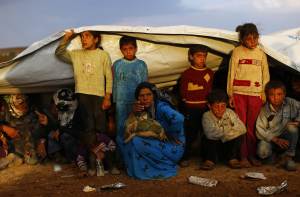
Syrian Kurdish refugees shield themselves from rain after crossing into Turkey from the Syrian borde …
"The motion prepares the legal ground for possible interventions, but it is too early to say what those interventions will be," said Dogu Ergil, a professor of political science and a columnist for Today's Zaman newspaper.
The motion could allow Iraqi Kurdish fighters to use Turkey's territory to safely cross into Syria to help Syrian Kurdish forces there, or permit the deployment of coalition forces' drones, Ergil said.
Turkey could also allow its air base in Incirlik, some 160 kilometers (100 miles) from the Syrian border to be used by allied planes or for logistics.
In Washington, State Department spokeswoman Jen Psaki welcomed the Turkish move and said the U.S. was looking forward to strengthening cooperation between Turkey and the rest of the global coalition seeking to defeat the Islamic State group. She declined to say what specific assistance Turkey might be asked to contribute, saying officials were "now discussing what particular role they may play."
The U.S. envoy tasked with coordinating the global coalition, retired Marine Gen. John Allen, was to meet with officials in Turkey over the next week, Psaki said.
View gallery
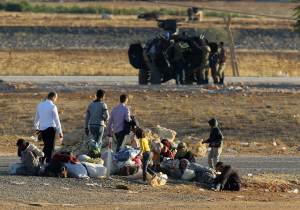
Syrian refugees from Kobani rest after arriving at the Turkey-Syria border crossing of Murstpinar ne …
Two opposition parties voted against the motion, which comes less than a year before parliamentary elections — a time when the Turkish government is unlikely to take bold military action — and provoked a lively debate among lawmakers.
"Will you be sending the (ground) troops which Obama did not want to send?" opposition legislator Osman Koruturk asked during the debate.
In Syria, Ismet Sheikh Hasan, a senior fighter, said the Kurdish forces were preparing for urban clashes in Kobani in a desperate attempt to repel the militants.
"We are preparing ourselves for street battles," Hasan said. "They still haven't entered Kobani, but we are preparing ourselves."
The Britain-based Syrian Observatory for Human Rights, an activist group tracking the Syrian conflict, reported that Islamic State fighters were, in some cases, just hundreds of yards from Kobani on its eastern and southeastern side. The militants were about a mile away on the southern side of town.
View gallery
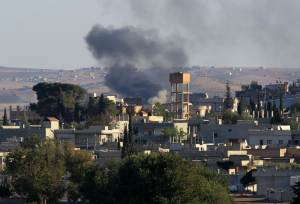
Smokes rise after a mortar shell landed in the south of the city center of Syrian Kurdish town of Ko …
In a statement, the Observatory said it had "real fears" that the militants would storm Kobani and "butcher civilians remaining in the city."
Nasser Haj Mansour, a defense official in Syria's Kurdish region, said Islamic State fighters were sporadically shelling Kobani as they fortified their positions on the outskirts of town.
"It seems they are getting ready for a long battle," Haj Mansour said of the jihadi fighters. "Inside Kobani, forces are getting ready to repel the group in case there is an attack."
Haj Mansour said some civilians still remained in the town, and predicted the Islamic State group would face a more difficult time once fighting moves inside Kobani, where the Kurdish forces know its terrain and can launch house-to-house guerrilla warfare.
On Thursday, U.S.-led coalition aircraft carried out four airstrikes against Islamic State targets inside Syria, including one that destroyed a militant checkpoint near Kobani, the U.S. Central Command said. Others struck targets north of Sinjar Mountain, west of Raqqah and east of Aleppo, it said.
View gallery
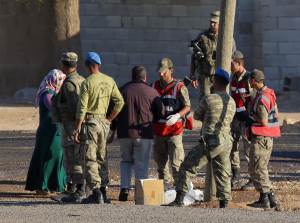
Turkish soldiers check documents of refugees as thousands of new Syrian refugees from Kobani arrive …
Islamic State militants also launched an assault Thursday on the western Iraqi town of Hit, military spokesman Qassim al-Moussawi said. The attack started at dawn when the militants, using at least three suicide bombers, struck checkpoints at the town's entrances, causing casualties among the security forces, al-Moussawi said.
The battle over Hit in Anbar province, 85 miles west of Baghdad, came as Iraqi Kurdish security forces, known as peshmerga, managed to dislodge the militants from the northwestern Iraqi towns of Rabia, Zumar and Mahmoudiyah, with the assistance of airstrikes by the U.S.-led coalition.
U.S. Central Command said late Thursday that coalition aircraft, including those from Britain, took part in airstrikes around Baghdad, Mosul, Fallujah, Ramadi and Sinjar.
Meanwhile, the U.S. Navy said a Marine who ejected from a plane over the Persian Gulf on Wednesday was "presumed lost at sea," marking the first reported U.S. fatality from the operation against the Islamic State group. The Marine, whose name was withheld pending notification of family, was deployed aboard the USS Makin Island, which is supporting military operations against the extremist group in Iraq and Syria.
Turkey had been reluctant to join its NATO allies in a coalition against the militants, citing worries about the safety of Turkish hostages held by the group, but reversed its decision after the hostages were released last month.
View gallery
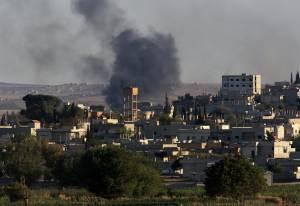
Smokes rise after a mortar shell landed in the south of the city center of Syrian Kurdish town of Ko …
President Recep Tayyip Erdogan has called for the creation of a buffer zone inside Syria as well as a no-fly zone to secure Turkey's borders and stem the flow of refugees. He has also called for military training and equipment for the Syrian opposition fighting the regime of Syrian President Bashar Assad.
"In the struggle against terrorism, we are open and ready for every kind of cooperation. However, Turkey is not a country that will allow itself to be used for temporary solutions," Erdogan said Wednesday.
"An effective struggle against ISIL or other terror organizations will be our priority," Erdogan said, using an alternative name for the Islamic State group. "The immediate removal of the administration in Damascus, Syria's territorial unity and the installation of an administration which embraces all will continue to be our priority."
__
Hadid reported from Beirut. Associated Press writers Bassem Mroue in Beirut, Desmond Butler in Istanbul and Lara Jakes in Washington contributed to this report.